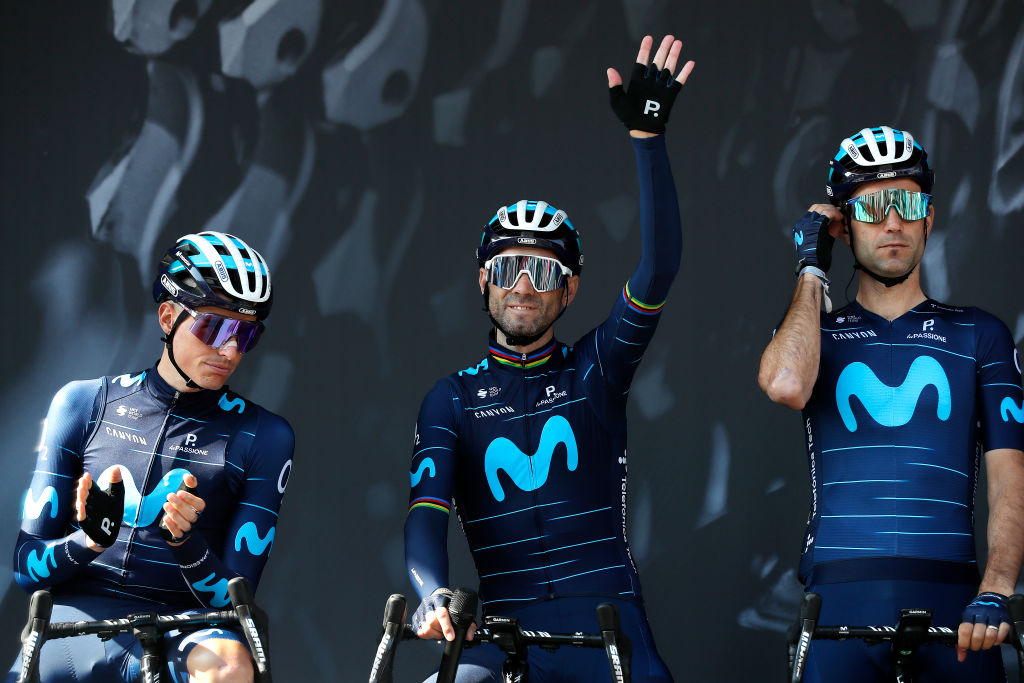UCI points system 'madness' and 'unfair' says Movistar boss
Valverde dragged into the relegation battle in farewell season

A number of teams have sleep-walked into a WorldTour relegation battle this season, but the gloves are off now as teams chase every possible UCI ranking point.
Movistar have recently been dragged into the mire after a poor spring campaign and their boss is not happy about it.
“It’s madness,” Eusebio Unzué, who has been involved with the team throughout its 42-year history, told Cyclingnews at the Critérium du Dauphiné.
Unzué has just had to phone up his old talisman, Alejandro Valverde, and politely ask if he wouldn’t mind adding the Ventoux Challenge and Route d’Occitanie to his programme next week. Valverde is 42 years old, retiring at the end of the season, and supposed to be enjoying his swansong after 18 years of service to the Spanish team. Instead even Valverde has to chase points.
“It does serve a purpose, he also has the Spanish championships coming up…" Unzué suggests, but he can’t keep up the pretence for long.
“But logically, at the same time…” he adds, trailing off. “We’re going there to race with him like we always do, to win, but at the same time we’re trying to score points, obviously.”
Valverde might have imagined his final season a little differently. He might have felt he’d earned the right to call the shots and essentially choose the stops on his farewell tour. But Unzué revealed his trusty breadwinner had no qualms about being roped in to help with the more menial tasks.
Get The Leadout Newsletter
The latest race content, interviews, features, reviews and expert buying guides, direct to your inbox!
“Fortunately, Alejandro has been, as ever, exemplary. He’s the first to be willing to do what needs to be done.
“He’s aware that we’re a little obliged to go after some points, because that’s what the system demands. It’s unthinkable, really, but that’s the situation we find ourselves in.”
The situation that Movistar find themselves in, as of the weekend of 11-12 June, is in 16th in the three-year ranking table that will decide WorldTour status from 2023.
With 20 contenders for 18 spots, and with the second-division Alpecin-Fenix and Arkéa-Samsic looking set move up due to a haul of points, two current WorldTour teams are set to be ‘relegated’ at the end of the season.
Movistar, who picked a bad time to have possibly the worst three-year period of their long history, are not in immediate danger but things have become so congested at the bottom that not even a team with such a rich history can rest on their laurels.
“There are six or seven of us who are having to race to get points. It’s madness,” Unzué said. “With all due respect, I think we should be racing to guarantee the spectacle of cycling.”
'Points scale makes no sense'
The problem, as Unzué sees it, is not the idea of promotion and relegation per se, but the points system on which it has been based.
The points scale across the various race categories (WorldTour to .1) is a complicated concoction that has created question marks over weighting, with a Grand Tour stage less valuable than a third-tier one-day race. Arkéa’s rise and Lotto’s recent progress have been based on targeting the host of smaller one-day races in Belgium and France, sometimes steering their best riders away from the most prestigious races.
“The points system needs to be reformed,” Unzué stated.
“It doesn’t seem logical to me that in order to stay in the first division, we have to go and search for points in the second and third divisions. You try and explain that to fans of other sports. It doesn’t make any sense.”
For Movistar, the imbalance was felt more acutely than ever on Saturday. Their rider Carlos Verona won stage 7 of the Critérium du Dauphiné, breaking away over the Galibier and Croix de Fer and holding off Primoz Roglic on the final climb to Vaujany. He collected 60 points for his troubles. At the very same time, Oscar Riesebeek was picking up 200 for Alpecin-Fenix for winning Dwars door Het Hageland.
“I understand the system was created with good intentions but it’s not fair. We need to think about how we can make it more meritorious, logical, reasonable, proportional to the quality of the riders,” Unzué said.
“The points you obtain often don’t do justice to what you did in the race, and that’s another problem. It’s artificial. We have to value other things.”
Like it or not, the system is here to stay, at least until the next three-year WorldTour cycle, and Movistar will have to learn to play it. Verona’s win was a timely boost, but they’ll need Enric Mas’ luck to turn and they’ll need Valverde to go out with a bang.
Asked how worried he really was by the prospect of relegation, Unzué laughed, exposing what he saw as another flaw in the system.
“If you’re in 19th or 20th, you can even end up in a more privileged position,” he said, referring to the fact that the top two ranked second-division teams in 2022 receive automatic invites to all 2023 WorldTour events, without the obligation to attend.
“You end up not knowing if it’s better or worse to finish bottom. The system has to change,” he concluded.
Patrick is a freelance sports writer and editor. He’s an NCTJ-accredited journalist with a bachelor’s degree in modern languages (French and Spanish). Patrick worked full-time at Cyclingnews for eight years between 2015 and 2023, latterly as Deputy Editor.
